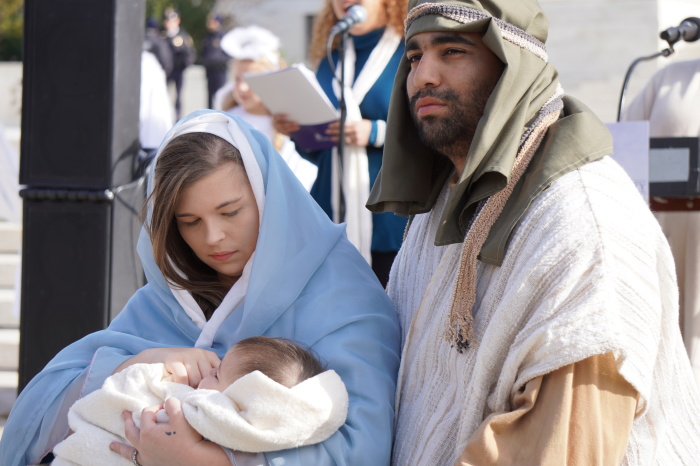What does the Bible say about the virgin birth of Jesus Christ?

Do Christians really believe in the virgin birth of Jesus Christ?
Belief in the virgin birth is an essential doctrine of the Christian faith, says Jason Jimenez, host of the "Challenging Conversations" podcast, rebuking those who teach false doctrine by denying the incarnation.
"The incarnation is foundational to the Christian faith," Jimenez declared, noting that many atheists, agnostic skeptics and even some progressive Christians deny the virgin birth of Jesus Christ — that God took on flesh and became like us (Hebrews 2:14-16).
While some discount Luke's and Matthew's accounts of the Nativity story and "say that it's hogwash, that it's all been made up or concocted by later Christian followers" or by the early disciples to "deify the Savior," like paganistic religions, Mary's virgin birth is "credible," Jimenez maintained.
Here's what the Bible teaches about Mary being a virgin when she conceived Jesus.
The virgin will conceive and give birth to a son, and they will call him Immanuel. Matthew 1:23
... God sent the angel Gabriel to Nazareth, a town in Galilee to a virgin pledged to be married to a man named Joseph, a descendant of David. The virgin’s name was Mary. Luke 1:26-27
“How will this be,” Mary asked the angel, “since I am a virgin?”
The angel answered, “The Holy Spirit will come on you, and the power of the Most High will overshadow you. So the holy one to be born will be called the Son of God. Even Elizabeth your relative is going to have a child in her old age, and she who was said to be unable to conceive is in her sixth month. For no word from God will ever fail.”
“I am the Lord’s servant,” Mary answered. “May your word to me be fulfilled.” Then the angel left her. Luke 1:34-38
There are key pieces of evidence for Jesus' virgin birth in the Gospels and four dates Christians should know and share when discussing this with a nonbeliever, said Jimenez, who's also the founder of Stand Strong Ministries and a faculty member at Summit Ministries.
He added that the canonical Gospels "bear witness to virginal conception of Jesus in Jerusalem," and the question to ask is, "who had the story first?"
Listen to the full episode of Defending the Virgin Birth on the Edifi Podcast Network
"If we can't prove that (Mark), Matthew and Luke were written first ... if we are unable to verify and validate and to confirm solid, early dates in the canonical Gospels, then ... paganistic rituals and traditions will become dominant."
Although some self-identified Christians might claim that the virgin birth of Jesus Chris is not true and that the Gospel accounts are late in their date, "that is factually untrue, Jimenez stressed.
“Mark is the earliest and first Gospel. And we know the date that Mark was writing — John Mark, the cousin of Barnabas — was in the early 50s [AD]. … So we have these early time frames. Here is John Mark writing within less than 20 years removed from Jesus' death, burial and resurrection,” Jimenez said, citing a series of important dates. “You have eyewitnesses who lived it, who can corroborate it, still alive in the heart of Jerusalem.”
"A lot of progressive Christians ... or atheist New Testament scholars ... refute the claims of the virgin birth because, they say, they're late or they'll say that nobody in that timeframe, like Paul and John, actually believe in the virgin birth. That's false," he reiterated. "We have early documentation within the canonical Gospels ... and we have Church fathers who are articulating" the virgin birth of Jesus, he added, naming Melito of Sardis; Eusebius of Caesarea; Ignatius, the third bishop of Antioch; Justin Martyr, who was an early Christian apologist and philosopher; and Tertullian, among others who taught about the virgin birth and fought against false doctrines such as Gnosticism.
And the virgin birth of Jesus is not just a copy of paganism, he maintained, refuting a common tactic by some to cite the gospel of Thomas, which is among “the most quoted gnostic writings” that is "late" and "not historically verifiable."
“Yeah, we have copies of it. But when we dig deeper into these 114 sayings, we clearly see that it's esoteric language. That it does not in any way, shape or form show similarity or familiar structure to how the canonical writers wrote their biographies of Jesus,” Jimenez said.
“The Gospel of Thomas clearly undermines the teachings of the kingdom of Heaven versus when you look at the canonical Gospels."
Listen to the full episode of Defending the Virgin Birth on the Edifi Podcast Network
Nicole Alcindor is a reporter for The Christian Post. She can be reached at: [email protected].




























